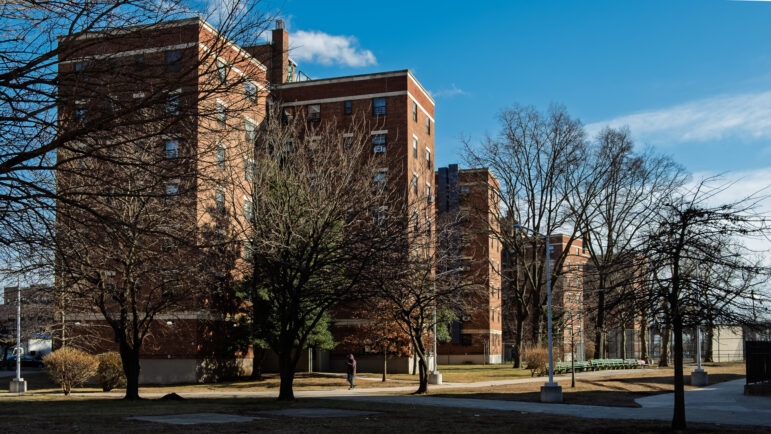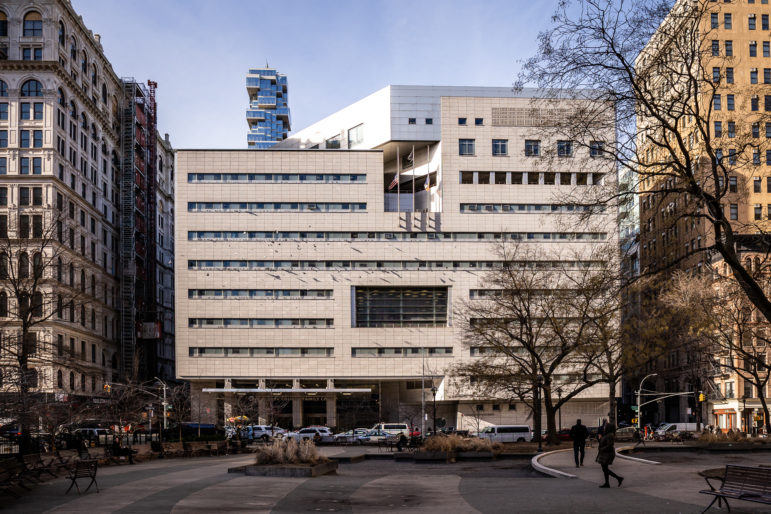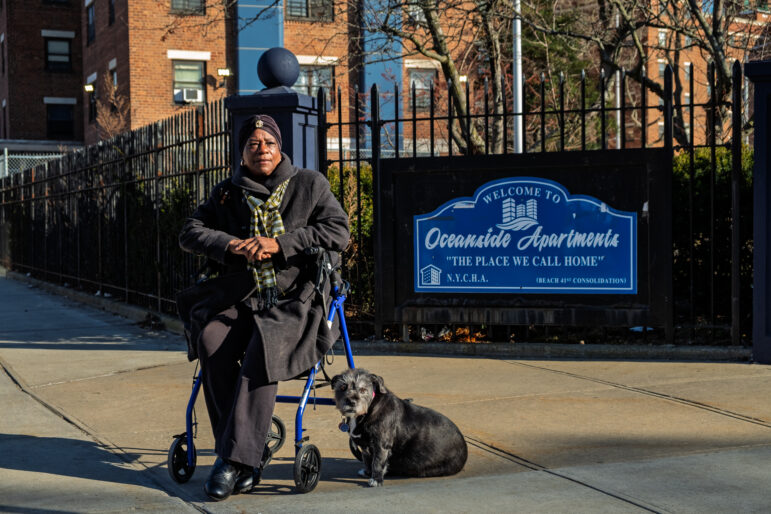A joint City Council hearing Tuesday tackled a multiyear bribery scandal that affected more than 100 developments across the city. “These charges are unacceptable and robbed the residents of NYCHA of getting more important jobs done,” one tenant leader testified.
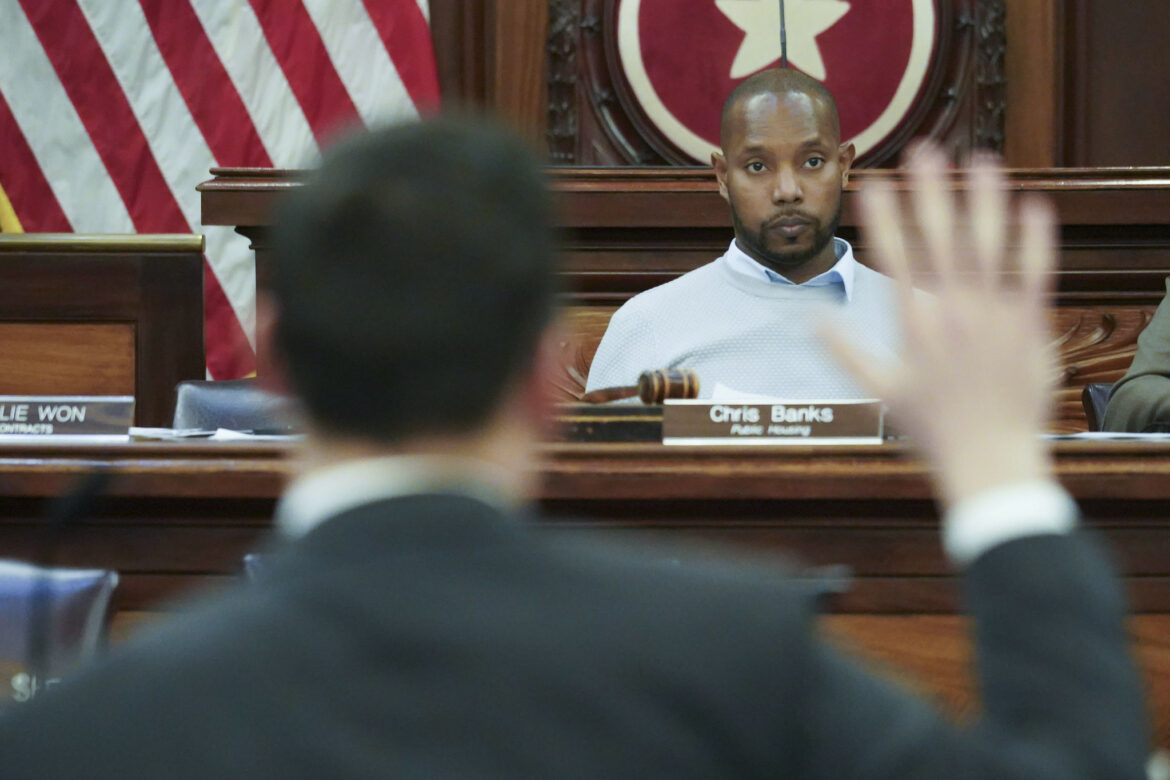
Gerardo Romo / NYC Council Media Unit
City Councilmember Chris Banks leading the Committee on Public Housing hearing Tuesday, which focused on NYCHA’s responses to the recent bribery scandal.Exactly three weeks after 70 current and former employees were charged for their alleged participation in a major bribery scheme, New York City Housing Authority officials took the hot seat to address the underlying federal investigation and how they plan to prevent overpriced repair contracts in the future.
The accused workers came under fire on Feb. 6 for allegedly pocketing $2 million in bribes by steering more than $13 million in contracts for basic repairs at NYCHA developments across the city. Currently, repair work costing under $10,000 does not require a competitive bidding process.
In this environment, prosecutors say NYCHA workers billed exorbitantly high rates for simple jobs. For example, as reported by The City, $4,250 to change six LED light bulbs.
As the investigation continues, NYCHA is under an even more watchful eye to restore and maintain its properties, as well as the trust of the residents who live in them.
NYCHA’s Chief Executive Officer Lisa Bova-Hiatt emphasized that she has zero tolerance for the “wrongful and illegal activities” in NYCHA. “These alleged actions are counter to everything we stand for as public servants and will not be tolerated in any form,” she said.
Bova-Hiatt added that the housing authority will be seeking compensation.
“I have spoken with our inspector general and I have asked him to speak with the U.S. Attorney’s Office and to the extent that we can be, we will be seeking restitution not only from vendors who have overcharged NYCHA, but also from our employees,” she said. “People who have put their greed above the needs of NYCHA and over residents.”
All 55 workers who were employed until their arrests are currently suspended without pay. As of Tuesday, NYCHA had vacancies for eight property managers, nine superintendents and 25 assistant superintendents.
Bova-Hiatt said all open positions but 10 will be filled by May 4 or earlier.
The New York City Department of Investigation (DOI) presented 14 recommendations to NYCHA earlier this month in response to the scandal, including mandatory training sessions for superintendents and creating a cost estimate schedule for the top 15 services used by developments—an effort to guard against overcharges.
Some of the suggested reforms, including that NYCHA task centralized staff with approving micropurchases instead of employees within housing developments, are similar to overhauls the DOI pressed for in 2021.
NYCHA estimates that the adoption of all 14 recommendations will take up to one year.
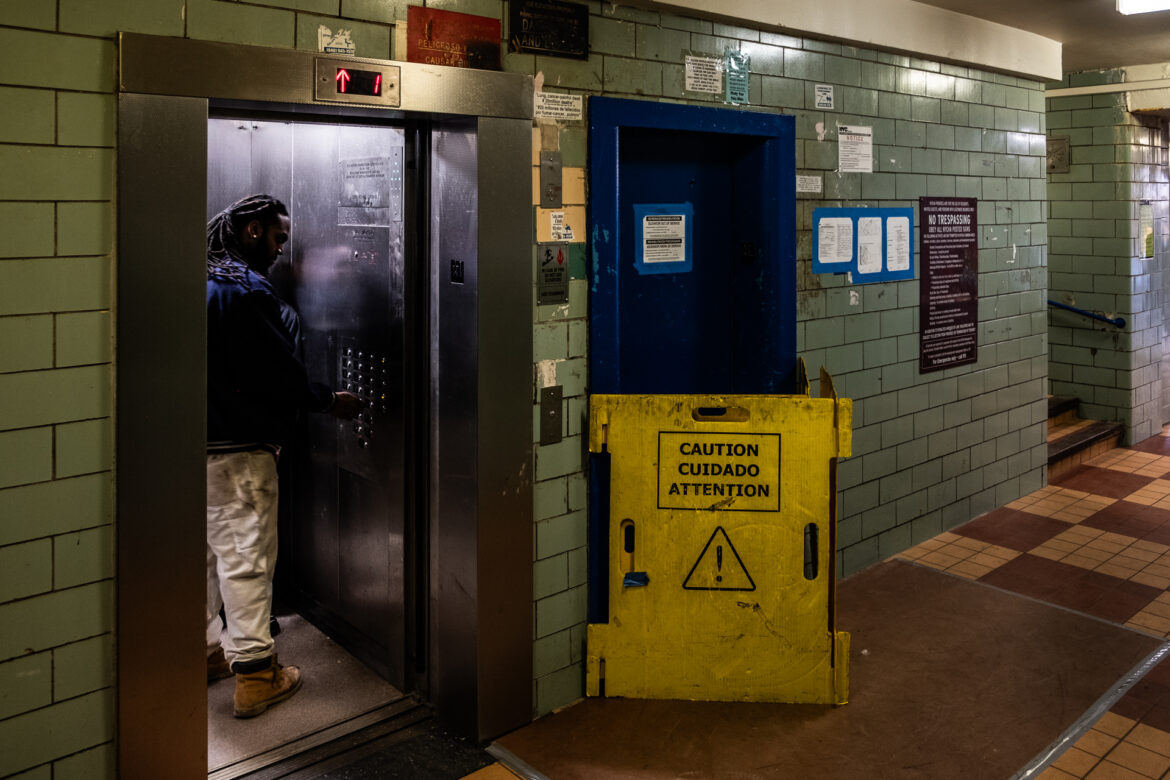
Adi Talwar
Only one of two elevators was functioning at NYCHA’s Mitchel Houses apartment building located at 175 Alexander Ave., Bronx, on Feb. 7, 2024. The housing authority saw more than 229,000 new work orders lodged in January alone.The lack of competitive bidding for micropurchases was intended to give the housing authority flexibility to make quicker fixes. While Bronx Councilmember Althea Stevens said Tuesday that she supported the changes presented by the DOI, she was also concerned about the timeliness of repairs.
“In these instances, sometimes we overcorrect and then we are at a process where residents are waiting even longer,” she said.
Dana Elden, a tenant association president at the St. Mary’s Park Houses in the Bronx, voiced her frustrations while testifying over Zoom Tuesday.
“These charges are unacceptable and robbed the residents of NYCHA of getting more important jobs done,” Elden said. “It is frightening to think that residents will have to wait for years for necessary work to be done… the quality of life issues that residents are facing is already disgraceful.”
Daniel Greene, the executive vice president of property management operations at NYCHA, testified that 229,000 new work orders were created in January alone. December saw 200,000 and November 211,000.
“Every single month we’re getting a very high volume of work that we have to do,” Greene said.
Despite the number, Greene added that NYCHA is making strides to do repairs, citing a decrease of roughly 66,000 outstanding work orders between May 2023 and the end of January 2024.
“A lot of the work orders are paint work orders,” said Greene. “Right now, we simply don’t have enough painters or vendors to be able to cover all of the painting work orders that have been created.”
Greene testified that NYCHA used 948 unique vendors in 2022 and 766 in 2023 for both commodities and services.
He pointed out that although some vendor work can be done in apartments, most is for campus grounds such as fencing and lobby doors.
“We have very large grounds so we have a lot of fences, a lot of pump equipment that we need in our mechanical areas. We have lobby doors, we have doors in each of our stairwells,” Greene said. That’s the type of work “where we would turn to a vendor,” he added.
Unit repairs such as painting and plastering jobs can be handled by NYCHA’s Skilled Trade team, he said.
Karen Blondel, a Brooklyn tenant association president at the Red Hook Houses and Public Housing Preservation Trust board member, was among the last to testify Tuesday.
She admitted being taken aback by the charges, which swayed her views on the future of NYCHA—particularly the controversial Permanent Affordability Commitment Together (PACT) program, which leases public housing campuses to private developers and management companies that take over day-to-day operations.
“I was 100 percent against RAD-PACT but now thinking about this $708 light bulb I believe that with RAD-PACT under private developers they would never let anyone charge them $708 for a light bulb,” Blondel said. “When I found out the Preservation Trust would be using the same NYCHA employees, it took me about a month to get myself together.”
Blondel ended her statement by imploring the NYCHA community to “get this together.”
“We have to have confidence as residents, as resident leaders… that we’re going to turn this ship around,” she said.
To reach the reporter behind this story, contact Tatyana@citylimits.org. To reach the editor, contact Emma@citylimits.org




